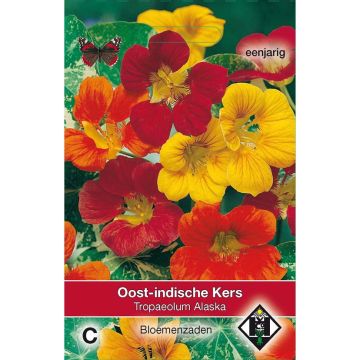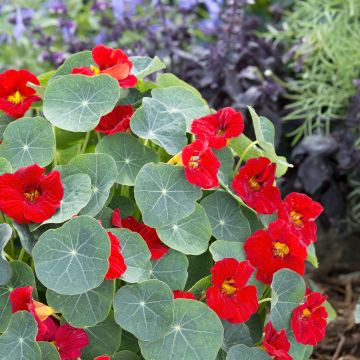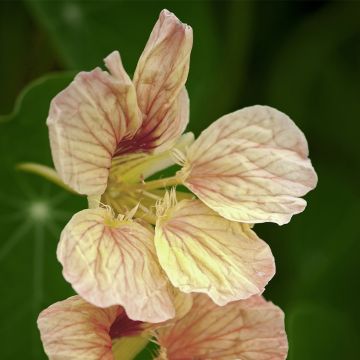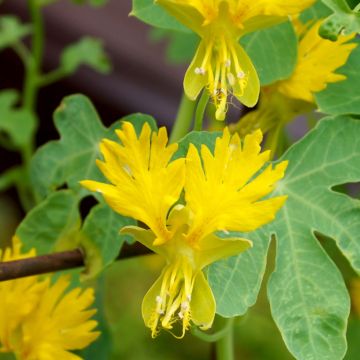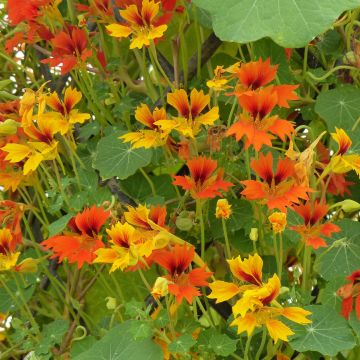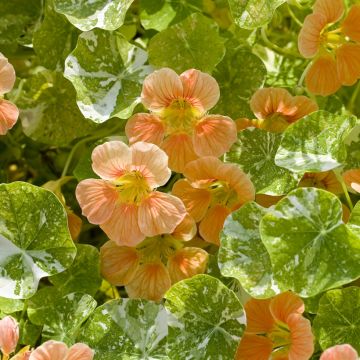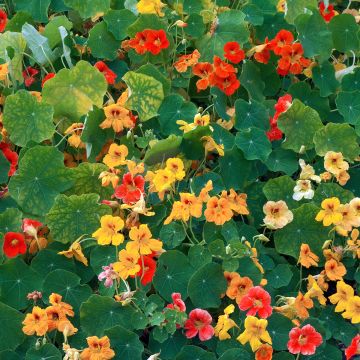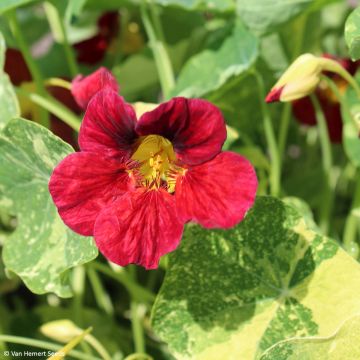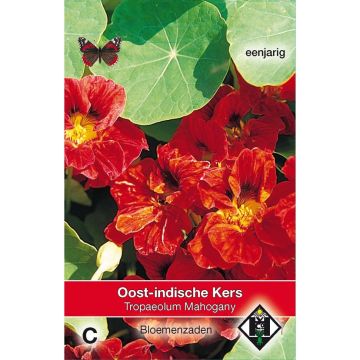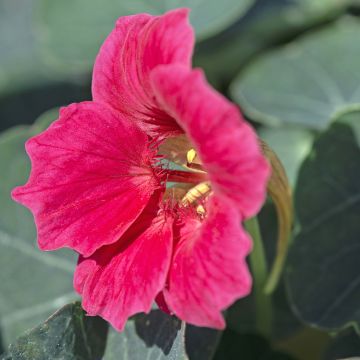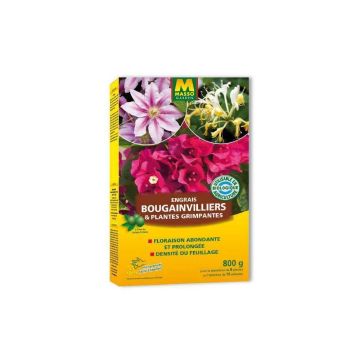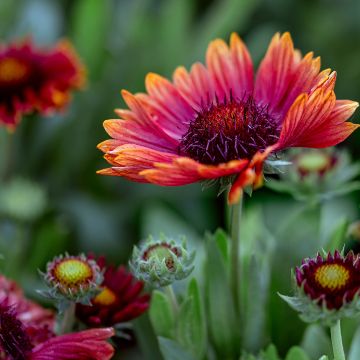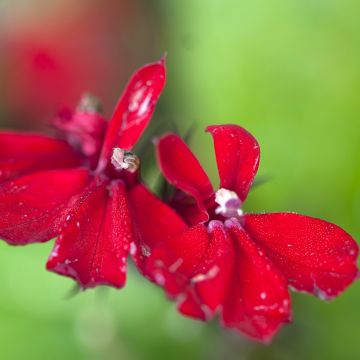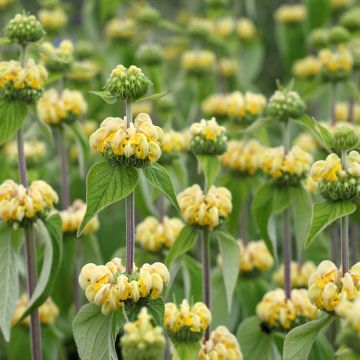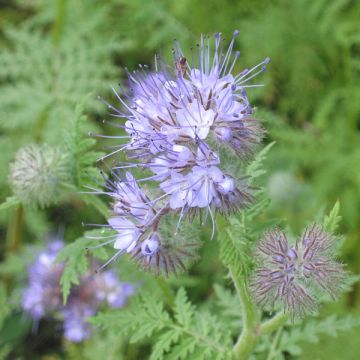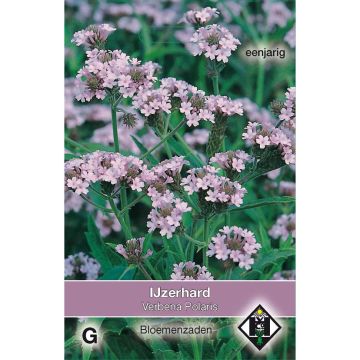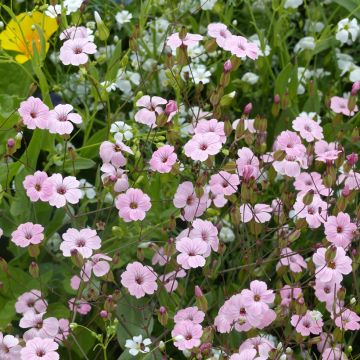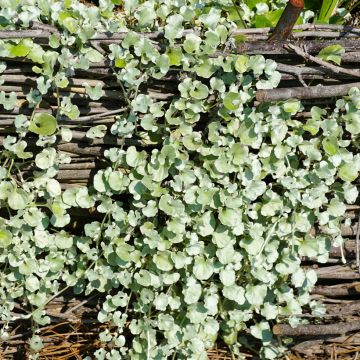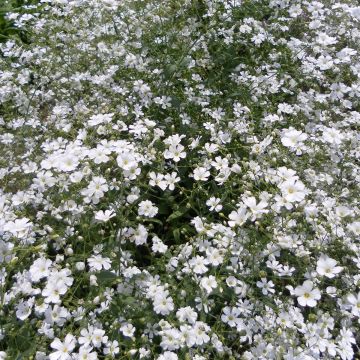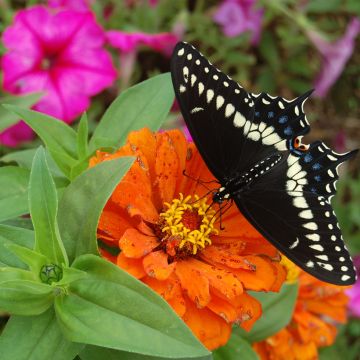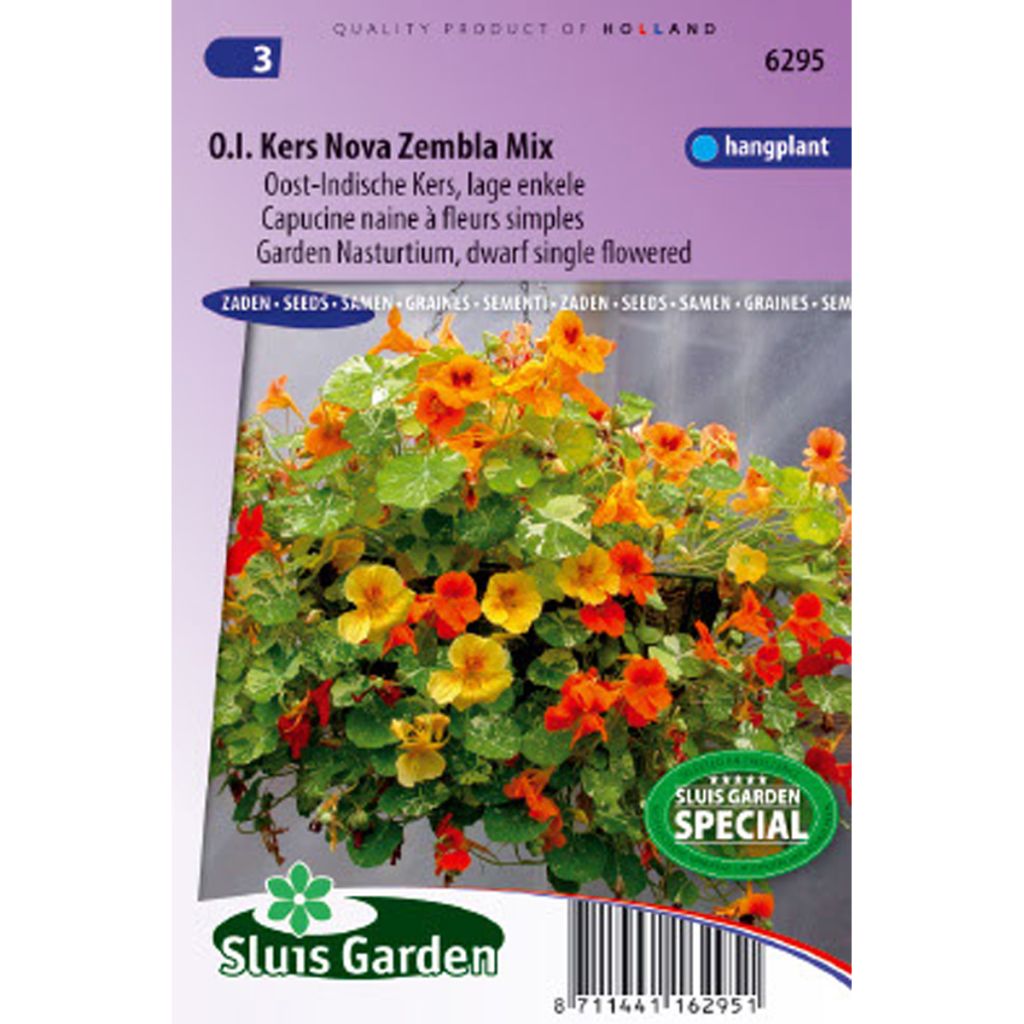

Tropaeolum majus minus Nova Zembla Seeds - Dwarf Nasturtium
Tropaeolum majus minus Nova Zembla Seeds - Dwarf Nasturtium
Tropaeolum majus minus Nova Zembla
Garden Nasturtium, Dwarf Indian Cress
This item cannot be shipped to the selected country
Dispatch by letter from €3.90
More information
Schedule delivery date,
and select date in basket
This plant carries a 6 months recovery warranty
More information
We guarantee the quality of our plants for a full growing cycle, and will replace at our expense any plant that fails to recover under normal climatic and planting conditions.
Seed-only orders are dispatched by sealed envelope. The delivery charge for seed-only orders is €3.90.
Does this plant fit my garden?
Set up your Plantfit profile →
Description
Tropaeolum majus minus 'Nova Zembla Mix' is a dwarf nasturtium with variegated green and cream foliage and single flowers in a wide range of bright shades. The compact plants are especially suited to hanging baskets, window boxes and containers. Nasturtiums are famously easy to sow and easy to grow. They will give good results in loose, average garden soil with plenty of sunshine.
Tropaeolum majus, commonly known as Nasturtium, is an annual climbing or trailing plant native to South America. It belongs to the Tropaeolaceae family and comes in a variety of forms, some of which are dwarf and compact, others with a trailing habit. 'Nova Zembla Mix' is a dwarf variety that forms 20 cm mounds in one growing season. It flowers from June to September, displaying an abundance of 5-petalled tubular, spurred blooms in bright shades of yellow and orange. Pollinated flowers give way to small, pea-like seeds that are easy to sow. The foliage consists in round, light green leaves with distinct veining and random cream-coloured splashes and stripes.
Nasturtiums are versatile, easy going plants that will find their place almost anywhere, from borders to rock gardens, pots to hanging baskets. They enjoy cool, loose soil and a sunny position. All parts of the plant are edible: leaves and flowers can be tossed into summer salads; seeds can be pickled in vinegar like capers. Nasturtiums can also be grown as companion plants in vegetable gardens or orchards as they create a diversion for unwanted insects such as aphids (whilst providing valuable food for ladybird larvae), steering them away from your precious crops. If your nasturtiums plants become overwhelmed with aphids, try spraying them with a mixture of water and soap.
Report an error about the product description
Flowering
Foliage
Plant habit
Botanical data
Tropaeolum
majus minus
Nova Zembla
Tropaeolaceae
Garden Nasturtium, Dwarf Indian Cress
South America
Other Nasturtium seeds
Planting and care
Sowing:
Direct sow your Nasturtiums from March to May. Choose a sunny spot, with well-drained, loosened soil. Sow in rows, 2 cm deep, 30 cm apart, then cover. Water regularly, especially during dry periods. Germination usually takes 7 to 12 days. When the seedlings are strong enough to be handled, thin them out, keeping one seedling every 30 cm.
Nasturtiums can also be sown indoors at a temperature of 15-25°C. When the plants are strong enough to be handled, transplant and harden them off gradually until they are ready to be moved outdoors (once frosts are no longer to be feared).
Nasturtiums like moist, well-drained soil, in the sun or half-shade. They are frequently feasted upon by aphids and cabbage moths. You can keep this under control by spraying your plants with mildly soapy water.
Sowing period
Intended location
-
, onOrder confirmed
Reply from on Promesse de fleurs
Flower seeds
Haven't found what you were looking for?
Hardiness is the lowest winter temperature a plant can endure without suffering serious damage or even dying. However, hardiness is affected by location (a sheltered area, such as a patio), protection (winter cover) and soil type (hardiness is improved by well-drained soil).

Photo Sharing Terms & Conditions
In order to encourage gardeners to interact and share their experiences, Promesse de fleurs offers various media enabling content to be uploaded onto its Site - in particular via the ‘Photo sharing’ module.
The User agrees to refrain from:
- Posting any content that is illegal, prejudicial, insulting, racist, inciteful to hatred, revisionist, contrary to public decency, that infringes on privacy or on the privacy rights of third parties, in particular the publicity rights of persons and goods, intellectual property rights, or the right to privacy.
- Submitting content on behalf of a third party;
- Impersonate the identity of a third party and/or publish any personal information about a third party;
In general, the User undertakes to refrain from any unethical behaviour.
All Content (in particular text, comments, files, images, photos, videos, creative works, etc.), which may be subject to property or intellectual property rights, image or other private rights, shall remain the property of the User, subject to the limited rights granted by the terms of the licence granted by Promesse de fleurs as stated below. Users are at liberty to publish or not to publish such Content on the Site, notably via the ‘Photo Sharing’ facility, and accept that this Content shall be made public and freely accessible, notably on the Internet.
Users further acknowledge, undertake to have ,and guarantee that they hold all necessary rights and permissions to publish such material on the Site, in particular with regard to the legislation in force pertaining to any privacy, property, intellectual property, image, or contractual rights, or rights of any other nature. By publishing such Content on the Site, Users acknowledge accepting full liability as publishers of the Content within the meaning of the law, and grant Promesse de fleurs, free of charge, an inclusive, worldwide licence for the said Content for the entire duration of its publication, including all reproduction, representation, up/downloading, displaying, performing, transmission, and storage rights.
Users also grant permission for their name to be linked to the Content and accept that this link may not always be made available.
By engaging in posting material, Users consent to their Content becoming automatically accessible on the Internet, in particular on other sites and/or blogs and/or web pages of the Promesse de fleurs site, including in particular social pages and the Promesse de fleurs catalogue.
Users may secure the removal of entrusted content free of charge by issuing a simple request via our contact form.
The flowering period indicated on our website applies to countries and regions located in USDA zone 8 (France, the United Kingdom, Ireland, the Netherlands, etc.)
It will vary according to where you live:
- In zones 9 to 10 (Italy, Spain, Greece, etc.), flowering will occur about 2 to 4 weeks earlier.
- In zones 6 to 7 (Germany, Poland, Slovenia, and lower mountainous regions), flowering will be delayed by 2 to 3 weeks.
- In zone 5 (Central Europe, Scandinavia), blooming will be delayed by 3 to 5 weeks.
In temperate climates, pruning of spring-flowering shrubs (forsythia, spireas, etc.) should be done just after flowering.
Pruning of summer-flowering shrubs (Indian Lilac, Perovskia, etc.) can be done in winter or spring.
In cold regions as well as with frost-sensitive plants, avoid pruning too early when severe frosts may still occur.
The planting period indicated on our website applies to countries and regions located in USDA zone 8 (France, United Kingdom, Ireland, Netherlands).
It will vary according to where you live:
- In Mediterranean zones (Marseille, Madrid, Milan, etc.), autumn and winter are the best planting periods.
- In continental zones (Strasbourg, Munich, Vienna, etc.), delay planting by 2 to 3 weeks in spring and bring it forward by 2 to 4 weeks in autumn.
- In mountainous regions (the Alps, Pyrenees, Carpathians, etc.), it is best to plant in late spring (May-June) or late summer (August-September).
The harvesting period indicated on our website applies to countries and regions in USDA zone 8 (France, England, Ireland, the Netherlands).
In colder areas (Scandinavia, Poland, Austria...) fruit and vegetable harvests are likely to be delayed by 3-4 weeks.
In warmer areas (Italy, Spain, Greece, etc.), harvesting will probably take place earlier, depending on weather conditions.
The sowing periods indicated on our website apply to countries and regions within USDA Zone 8 (France, UK, Ireland, Netherlands).
In colder areas (Scandinavia, Poland, Austria...), delay any outdoor sowing by 3-4 weeks, or sow under glass.
In warmer climes (Italy, Spain, Greece, etc.), bring outdoor sowing forward by a few weeks.

































